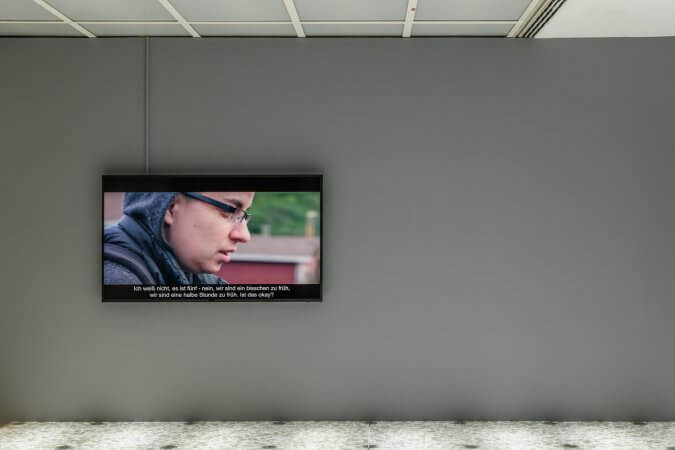„Guts”, ein Film von Taylor Hess und Noah Hutton
Guts, 2019
HD-Video, 12:52 min
Featuring the Island of Newfoundland, CLEAR, Rick Chavolla, and Max Liboiron
Cinematography and Editing by Taylor Hess and Noah Hutton
Courtesy Taylor Hess and Noah Hutton
The short film Guts, directed by Noah Hutton and Taylor Hess, addresses the responsibility of science and its independence in the service of socio-ecological transformation. The film’s leading player is the research collective CLEAR in Newfoundland, Canada. Shot in the Beothuk and Mi’kmaq territories, which are inhabited by the indigenous communities of NunatuKavut, Nunatsiavut, and the Innu Nation, the film documents the collective’s work. Led by Dr. Max Liboiron, CLEAR stands for Civic Laboratory for Environmental Action Research and describes itself as an activist, anti-colonial and feminist laboratory.
The collective represents a new generation of scientists who combine Western-shaped natural science methods with local indigenous traditional knowledge and ethical treatment of non-human beings and humans alike. CLEAR specializes in community-based, citizen-led monitoring of plastic pollution, particularly in wild food chains. Another area of focus is the development and application of anti-colonial research methods. The film illustrates the full extent of plastic pollution in the oceans and its impact on humans and nature, emphasizing the urgent need for sustainable materials and alternatives to plastic.
In the film, Dr. Max Liboiron explains that science is by no means apolitical. The history of science, technology and medicine is inseparable from the history of colonialism, imperialism and war. Even the decisions about which aspects of a phenomenon to investigate – such as the choice of quantification methods, the statistics used or created, the framing of issues, where results are published, who collaborates, who funds the research – all of this is political. It means that some structures and power dynamics persist and influence which knowledge is listened to and which is not. Dominant knowledge systems primarily reflect the perspectives of white, male, Western scientists, and this has led to a limited and biased understanding of the world. For this reason, the continuation of the status quo in scientific work is intrinsically political.
The work of the CLEAR Lab is informed by Donna Haraway and other feminist science scholars who coined the term ‘situated knowledge’ in the 1980s. According to Haraway and others, all knowledge is situated because it is produced by people in specific social, cultural and historical contexts. This perspective is especially important for feminist and marginalized viewpoints: Situated knowledge recognizes the diverse experiences and perspectives of different groups and values the knowledge that arises from these experiences. By acknowledging the situatedness of knowledge, we can become more aware of the power structures that shape the accumulation of knowledge and work towards creating more inclusive and equitable knowledge systems. CLEAR Lab is committed to applying new methods and ethics in science, as well as distributing knowledge and DIY research methods to citizens (known as Citizen Science).



